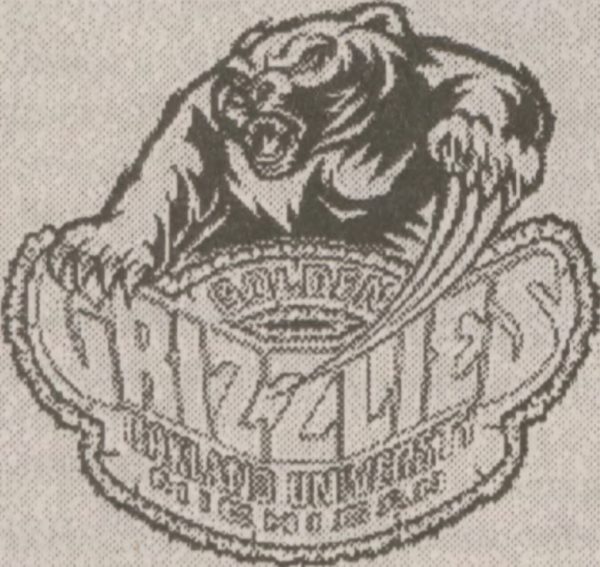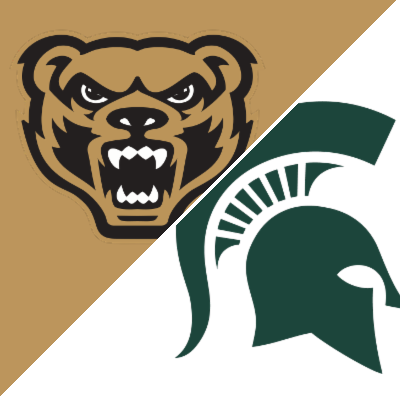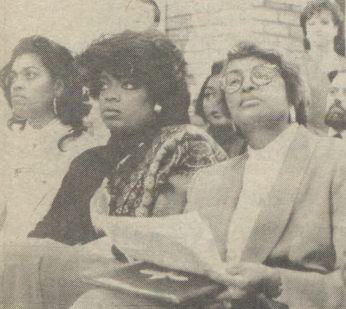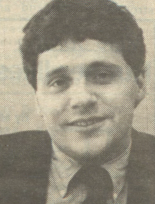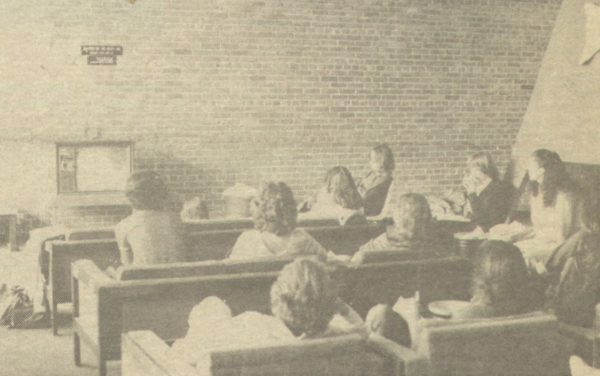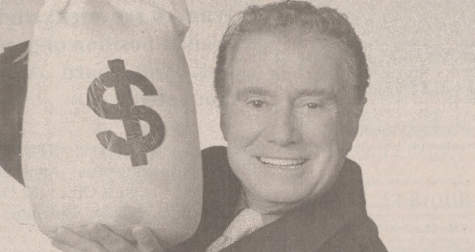Leader Dogs on duty at Oakland
After finding a chair for his owner and tapping it with his nose, Mr. Ford laid down and put his head on his paws. The big German shepherd with thick fur belongs to Dave Barber, a junior Oakland University student.
Barber is blind and Mr. Ford is his leader dog. When Barber began studying social work at OU in the fall semester of 2008, Leader Dogs for the Blind provided him with a mobility orientation on campus. The non-profit organization with headquarters in Rochester Hills celebrated its 70th year of service this April and has trained nearly 14,000 leader dogs, who are placed with blind or visually impaired people.
Mr. Ford is one of them, and became a leader dog and guide for Barber nine years ago.
“His job is to bring me from one point to the other safely,” said the 52-year-old who graduated with honors from Oakland Community College last year with an associate degree in applied science, mental health and social work. He also has an associate degree in applied science, radio and television from Ohio University.
Mr. Ford became Barber’s second official service pet in 2000, after he retired his first leader dog Mr. Brutus with whom he spent 12 years.
“I put Mr. in front of Ford because that makes him more formal,” Barber said. He started using a courtesy title for his dog to control kids who often come up and want to pet his furry guide. “Do not pet me, I am working,” reads the yellow sign attached to Mr. Ford’s harness.
Barber, who moved from Ohio to Michigan in 1993, hasn’t always been blind. “For the first 12 years of my life I could see. Due to an inherited genetic disorder, I lost my sight over time,” he said.
As a teenager, Barber learned to find his way around with a cane. Gregory Grabowski, president and CEO of Leader Dogs for the Blind, said that having experience with a cane helps those interested in getting a leader dog.
“The accelerated orientation mobility class that we do with the white cane training — just to really kind of simplify it down — potentially is a prerequisite to getting the leader dog, ’cause you have to have good orientation mobility skills to start with before you get a dog,” Grabowski said.
Getting around
“Many times you will see the both of us running across campus pulling my school bags on wheels,” said Barber about himself and Mr. Ford who guides him confidently from one building to the other.
While Mr. Ford helps Barber around campus, his wife, classmates or friends give him a ride to school.
“Ford is such a good dog. He is so excited [about] being at school, he doesn’t even say goodbye to me,” said Deirdre Barber, 48, about dropping off both Mr. Ford and her husband at OU.
Barber also uses cab services or public transportation like the SMART buses to get to campus. “A nice bus shelter for those who have to wait in bad weather,” is his suggestion for an improvement on campus.
OU’s Office of Disability and Support Services has been another resource for Barber and other students with disabilities. Some of the services they offer are scanning and digitizing text books, computer stations with screen readers, alternate testing, door openers, advising and campus orientation.
Barber takes notes on a talking electronic data assistant and audio records lectures with a cassette machine. For researching online and reading web sites, there is JAWS, a screen reading software. An application called Kurzweil 1,000 is available at Kresge library.
“This combination of hardware and software allows me to scan printed text and read the printed paper document viaspeech,” Barber said.
On the day of an exam, he takes the same test like all other students of his class. The only difference is that he uses different tools to prepare for it.
“It’s not ‘look at the poor blind person, we need to treat him differently’, it is ‘they have availed themselves to all these tools and so now, they are equal footing,'” said Grabowski about blind or visually impaired college students.
Outside help
Even though Barber and Mr. Ford make a strong and harmonious team, sometimes situations occur when they need the support of others. Barber said he appreciates help, but asks people to approach him by saying who they are because their voices are the only way for him to remember them.
“Sometimes a person should come up and say ‘Hi, excuse me, do you need assistance?’ or come up to me and say ‘I see you’re traveling here, are you aware of where you’re at?’ Because the key is making sure to let the blind person as much as possible do for themselves,” he said. “It must be a dialog process between myself and the person providing assistance.”
Barber lives with his wife, his cat, Mr. Ford and a Shih Tzu. Barber’s mother-in-law calls the dogs “the elephant and the mouse” because of their size difference. When the couple goes for a bike ride on their tandem, the animals stay at home, including Mr. Ford.
“There’s a lot of things I’d love to do if I could have my sight back, a lot of things I used to do when I had sight,” said Barber. However, he doesn’t necessarily miss the time when he could ride a bike by himself because now, he and his wife have the tandem.
“Well, it would be nice to have my sight back. It would be nice to have it back, because I once had it. But, you know, when you’ve been doing this as long as I have, see … relationships with people are more important than having sight back.”






